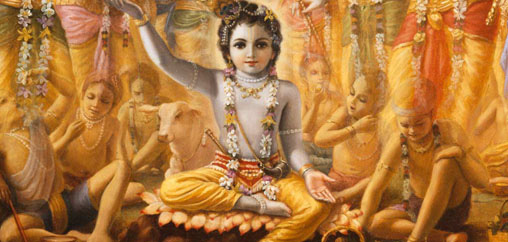By (Founder-Acharya Sree Chaitanya Gaudiya Math), Most Revered His Divine Grace Srila Bhakti Dayita Madhav Goswami Maharaj
If we accept the concept of Bhagawan, then we have to accept the concept of 'bhaga' also. If we use word 'dhanawan'(wealthy), but exclude the word 'dhana' (wealth), then the word 'dhanawan' becomes meaning less. It is the same situation with 'bhaga' and 'bhagawan'. He who possesses dhana (wealth) is dhanawan. Similarly, He who possessesbhaga is Bhagawan. Bhaga means majesty (aishwarya) or potency (shakti). Therefore, Bhagawan is He who possesses majesty and potency. The word Bhagawan does not specifically define the type of potency or energy involved. Therefore, Bhagawan is He who possesses all kinds of potencies or energies that could possibly exists. Thus Bhagawanis the Omnipotent one, As per Vishnu Purana (6.5.74), One who possesses all majesty or wealth, all potency or strength, all fame, all beauty, all knowledge and all renunciation is known as Bhagawan.
The fact that Bhagawan possesses all beauty implies that He is beautiful; therefore , He must possess form. However, in saying that He must possess form, we should not attempt to confine Him by the perishable limits of length, breadth and height. The internal potency (chit-shakti) of Bhagawan has its reflection as the material energy, which is subject to change and destruction. We must not attribute those faults to that which is being reflected, i.e. Bhagawan, Who has a transcendental spiritual Form. To do so would be foolish. Actually, Ultimate Existence is beyond the power of human intellect. The reflection has no real existence to speak of, but if the reflection gives the appearance of reality, then we must understand it to be a shadow reality – an unreal reality! Since a shadow is not real, we should not expect to derive true knowledge of reality from it.
In certain texts, it is stated that Bhagawan does not have limbs, yet He accepts and moves. He can without eyes, He can hear without ears, etc. The meaning of these apparently contradictory statements is that Bhagawan does not have material form like ours, which is made up of material elements. On the contrary, He has a transcendental spiritual Form. In truth, because Govinda, the Cause of all causes, possesses form, we see so many forms in the Universe. Without there being form in the cause, there can be no form in the effect; without there being form in the source, there can be no form in the reflection. Logically, something cannot come from nothing.
Now, if we admit to existence of Bhagawan, we also have to admit to existence of His eneregy or shakti. We cannot admit existence of Bhagawan without shakti. Even though Bhagawan is Omnipotent, there are three predominatingshakti's known respectively as internal potency (chit-shakti), the external potency (maya shakti) and poised in between these two are His manifested living beings known as tattastha or jiva shakti. The shakti that takes us to heart ofBhagawan is known as Antaranga shakti (internal potency).
The shakti which overwhelms and enchants us with His external features, taking us away from Bhagawan, is known asBahiranga shakti (external potency). The internal potency takes us towards, and the external potency takes us away from Bhagawan. The internal potency performs the unalloyed service of Bhagawan; thus it is referred to by the term 'bhakta' (devotee). Bhakta and Bhagawan are one non-dual substance. That one substance is composed of two moods or aspects: the predominating and the predominated, the enjoyer and the enjoyed, the served and the servitor, the object of worship and the worshipper.
Since Bhagawan is beyond our limited intellect, we cannot know Him by virtue of our merit alone. If that were so, then the very logic of Sri Bhagawan being all-opulent Supreme Lord, Omnipotent and Infinite, become negated. The only way of knowing Bhagawan is by the desire of Bhagawan Himself. To act according to the desire of Bhagawan is to have priti(affection), or bhakti. If we act according to Bhagawan's desire or in other words, if we follow the course laid down byBhagawan in 'shruti's' and 'smriti's', then this will be the very means of achieving the grace of Bhagawan. That being said, how are we to know those rules laid down in the scriptures that are dear to Bhagawan? The answer to this is, we must seek the company or devotees and take the shelter of a pure devotee of Bhagawan.
There are two types of bhakti – vaidhi bhakti and raganuga bhakti. The first is the trodden path of scriptural rules and regulations, and the second is the blazing fire of transcendental love and passion. Bhagawan can only be caught byraganuga bhakti. For e.g. Sri Nanda Maharaj and Mother Yashoda have trapped the Infinite with their pure love. If one could even reach the doors of such a devotee, would there be any doubt that he or she would definitely have darshan ofBhagawan? Please understand that the devotee of Bhagawan always desires to please Bhagawan. If anyone else tries to please Bhagawan, then the devotee becomes that person's slave.
Then again Bhagawan wants the devotee to be happy. If one loves the devotee, then that person captures Bhagawan. That is why those who love and serve Bhagawan's devotee can easily win the blessings of Bhagawan's grade.
It is not difficult to love Bhagawan. Knowledge, wealth, beauty, power, etc are not required in this love., As per Sreemad Bhagawatam (1.8.26), ' Those who are intoxicated with their birth (social status), wealth, learning and beauty are incapable of uttering the Name of Krishna, which can be taken by those who are bereft of all material assets.'
If all the pride in the world should occupy all the space in my heart, if I expend all my energies to chase after wealth, sex and power, then how can Sree Bhagawan find a place in such a heart? Although a welcome sign hangs at the gate, the inside is cluttered up with so much rubbish that the invited guests has to turn away, being unable to find a place to sit. In like manner, it is no use to externally extend a welcome to Bhagawan if the inside is clogged up with unwanted desires.Bhagawan may very well come, but He will go away without finding a place to sit.











